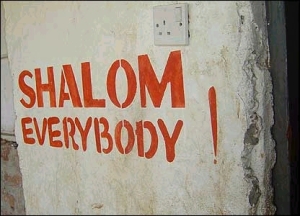Last Sunday for OGC’s 22nd anniversary I preached a message on Jeremiah 29:1-14 called Our City, Our Mission. You can listen to the audio here.
In verse seven of that passage the prophet tells the exiles from Judah living in Babylon to seek the welfare of the city to which Yahweh has sent them. The word for welfare is the Hebrew word shalom. It often gets translated by the English word peace. The word flourishing captures well the comprehensive nature of the term.
In his book, Generous Justice: How God’s Grace Makes Us Just, Tim Keller shares an example of a radical form of shalom-seeking that illustrates a serious commitment to this ethic within a community. It’s a bit long but worth the read.
An intriguing real life example of an entire community doing justice and seeking shalom is laid out in Yale professor Nora Ellen Croce’s book Everyone Here Spoke Sign Language. In the 1980’s Croce was researching hereditary deafness on Martha’s Vineyard. In the seventeenth century the original European settlers were all from a region in Kent, England, called “the Weald” where there was a high incidence of hereditary deafness. Because of their geographical isolation and intermarriage the percentage of deaf people increased across the whole island. By the nineteenth century one out of twenty-five people in the town of Chilmark was deaf and in another small settlement almost a quarter of the people could not hear. (Today, because of the mobility of the population and marriage with off-islanders, hereditary deafness has vanished. The last deaf person born on the Vineyard died in 1952.)
In most societies, physically handicapped people are forced to adapt to the life patterns of the nonhandicapped, but that is not what happened on the Vineyard. One day Croce was interviewing an older island resident and she asked him what the hearing people thought of the deaf people. “We didn’t think anything about them, they were just like everyone else,” he replied. Croce responded that it must have been necessary for everyone to write things down on paper in order to communicate with them. The man responded in surprise, “No, you see everyone here spoke sign language.” The interviewer asked if he meant the deaf people’s families. No, he answered, “Everybody in town–I used to speak it, my mother did, everybody.” Another interviewee said, “Those people weren’t handicapped. They were just deaf.” One other remembered, “They [the deaf] were like anybody else. I wouldn’t be overly kind because they, they’d be sensitive to that. I’d just treat them the way I treated anybody.”Indeed, what had happened was that an entire community had disadvantaged itself en masse for the sake of a minority. Instead of making the nonhearing minority learn to read lips, the whole hearing majority learned signing. All the hearing became bilingual, so deaf people were able to enter into full social participation. As a result of “doing justice” (disadvantaging themselves) the majority “experienced shalom”–it included people in the social fabric who in other places would have fallen through it. “When they had socials or anything up in Chilmark, why, everybody would go and they [the deaf] enjoyed it, just as much as anybody did. They used to have fun–we all did….They were part of the crowd, they were accepted. They were fishermen and farmers and everything else….Sometimes, if there were more deaf people than hearing there, everyone would speak sign language–just to be polite, you know.” Deafness as a “handicap” largely disappeared.
Perhaps the most interesting aspect of Croce’s research was the revelation of how hearing people had their own communication abilities enhanced. They found many uses for signing besides communication with the deaf. Children signed to one another during sermons in church or behind a teacher’s back at school. Neighbors could sign to one another over distances in a field or even through a spyglass telescope. One woman remembers how her father would be able to stand on a windy cliff and sign his intentions to fishermen below. Another remembers how sick people who could not speak were able to sign to make their needs known.In other words, the “disadvantage” that the hearing Vineyarders assumed–the effort and trouble to learn another language–turned out to be for their benefit after all. Their new abilities made life easier and more productive. They changed their culture in order to include an otherwise disadvantaged minority but in the process made themselves and their society richer.Martha’s Vineyard was a unique situation. However, in every time and culture, the principle holds. The strong must disadvantage themselves for the weak, the majority for the minority, or the community frays and the fabric breaks.
